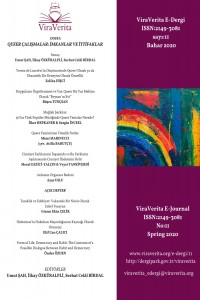Abstract
Bu çalışmanın amacı, Teresa De Lauretis’in düşüncesinde queer teorinin kuruluşu bağlamında
deneyim ve öznellik meselesini açığa çıkarmaktır. Lauretis’e göre, queer olmak, heteronormatif
düzeni, özdeşliği ve kimliği bozmaktır. Var olan normun sınırlarında, kurumların çatlaklarında inşa
edilen bir süreçtir. Lauretis’in nasıl queer düşüncenin temellerini kurduğunu açığa çıkarmayı
deneyen bu çalışma, öncelikle Lauretis’in cinsel fark düşüncesine yönelik eleştirisine değinir.
Lauretis’in düşüncesinin bu eleştiri üzerinden kurulduğuna dikkat çeker. Ardından Lauretis’te queer
teorinin temel iki unsuru olarak eksantrik özne ve deneyim meselesine değinir. Kelime anlamı acayip,
tuhaf olan eksantrik kavramı dolayımıyla Lauretis bir yandan geleneksel özne anlayışını alt üst eden
yeni bir öznellik fikrini kurarken diğer yandan cinsiyetin performatif niteliğine dikkat çeker. Bu
nedenle bu çalışma, geleneksel özne kavrayışını alt üst eden, yani queer hale gelen eksantrik özneyi
deneyim bağlamında ele alır. Sonuçta, Lauretis’in verili öznellik kipleri karşısında tuhaf kalma olarak
“eksantrik” kavramını deneyim nosyonuyla birlikte düşünmesi sayesinde queer siyaseti
kuramsallaştırma olanağı yakaladığını gösterir.
References
- Cerculle, Maxime/ Duroux, Françoise, “A Plusieurs Voix’ Autour De Teresa De Lauratis” La Decouverte, 2009, vol.1, n.57, p. 138-154
- De Lauretis, Teresa, Alice Doesn’t: Feminism, Semiotics, Cinema, The Macmillan Press, London and Bassinstoke, 1984.
- De Lauretis, Teresa, Technologies of Gender, Indiana University Press, Bloomington and Indianapolis, 1987.
- De Lauretis, “Displacing Hegemonic Discourses: Reflections on Feminist Theory in the 1980’s” Inscriptions, 1988, vol. 3, n.4 (http://culturalstudies.ucsc.edu/inscriptions/volüme-34/teresa-de-lauretis/).
- De Lauretis, Teresa, Differenza e Indifferenza Sessuale, Estro Editrice, Firenze, 1989.
- De Lauretis, Teresa, “Queer Theory: Lesbian and Gay Sexualities: An Introduction” Special Issue of Differences: A Journal of Feminist Cultural Studies, 1991, vol.3, n.2, p. iii-xviii.
- De Lauretis, Teresa, Figures of Resistance, University of Illinois Press, Urbana and Chicago, 2007.
- De Lauretis, Teresa, Freud’s Drive: Psychoanalysis, Literature and Film, Palgrave Macmillan Press, New York, 2008.
- Dişci, Zeliha, İktidar ve Sapma: Teresa De Lauretis’in Toplumsal Cinsiyet Teorisi, Çizgi Kitabevi Yayınları, İstanbul, 2020.
- Doan, L. Petra, “Cinsiyetlendirilmiş Alanların Tahakkümü: İkili Cinsiyet Sisteminin Ötesinden Yansımalar” Queer Temaşa içinde, der. Leman S. Darıcıoğlu, Sel Yayıncılık, İstanbul, 2015, ss. 147-173.
- Irigaray, Luce, Ben Sen Biz, çev. Sabri Büyükdüvenci ve Nilgün Tutal, İmge Kitabevi, Ankara, 2006.
- White, Patricia, “Introduction: Thinking Feminist” Figures of Resistance, University of Illinois Press, Urbana and Chicago.
Abstract
The purpose of this study is to reveal the question of experience and subjectivity in thougth of Teresa
De Lauretis in the context of the construction of queer theory. According to Lauretis, to be queer
means breaking the heteronormative order and identity. It is a process which is established at the
borders of the given norm and the cracks of institutions. This study, which attempts to reveal how
Lauretis constructs the foundations of queer thought, first touches on Lauretis’s critique of the idea
of sexual difference. It points out that Lauretis’s thought is established on the base of this critique.
It then addressess the issue of eccentric subject and experience as the two main elements of queer
theory in Lauretis. On the one hand, Lauretis overturns traditional understanding of subject through
the concept of eccentric which amounts to weird, bizarre and founds a new idea of subjectivity. On
the other hand, she draws attention to the performative nature of gender. For this reason, this study
deals with the eccentric subject, which subverts traditional understanding of the subject, that is,
becomes queer, in the context of experience. As a result, it shows that Lauretis had the opportunity
to theorize the queer politics by considering the concept of “eccentric” as remaining strange against
the given subjectivity modes with the notion of experience.
References
- Cerculle, Maxime/ Duroux, Françoise, “A Plusieurs Voix’ Autour De Teresa De Lauratis” La Decouverte, 2009, vol.1, n.57, p. 138-154
- De Lauretis, Teresa, Alice Doesn’t: Feminism, Semiotics, Cinema, The Macmillan Press, London and Bassinstoke, 1984.
- De Lauretis, Teresa, Technologies of Gender, Indiana University Press, Bloomington and Indianapolis, 1987.
- De Lauretis, “Displacing Hegemonic Discourses: Reflections on Feminist Theory in the 1980’s” Inscriptions, 1988, vol. 3, n.4 (http://culturalstudies.ucsc.edu/inscriptions/volüme-34/teresa-de-lauretis/).
- De Lauretis, Teresa, Differenza e Indifferenza Sessuale, Estro Editrice, Firenze, 1989.
- De Lauretis, Teresa, “Queer Theory: Lesbian and Gay Sexualities: An Introduction” Special Issue of Differences: A Journal of Feminist Cultural Studies, 1991, vol.3, n.2, p. iii-xviii.
- De Lauretis, Teresa, Figures of Resistance, University of Illinois Press, Urbana and Chicago, 2007.
- De Lauretis, Teresa, Freud’s Drive: Psychoanalysis, Literature and Film, Palgrave Macmillan Press, New York, 2008.
- Dişci, Zeliha, İktidar ve Sapma: Teresa De Lauretis’in Toplumsal Cinsiyet Teorisi, Çizgi Kitabevi Yayınları, İstanbul, 2020.
- Doan, L. Petra, “Cinsiyetlendirilmiş Alanların Tahakkümü: İkili Cinsiyet Sisteminin Ötesinden Yansımalar” Queer Temaşa içinde, der. Leman S. Darıcıoğlu, Sel Yayıncılık, İstanbul, 2015, ss. 147-173.
- Irigaray, Luce, Ben Sen Biz, çev. Sabri Büyükdüvenci ve Nilgün Tutal, İmge Kitabevi, Ankara, 2006.
- White, Patricia, “Introduction: Thinking Feminist” Figures of Resistance, University of Illinois Press, Urbana and Chicago.
Details
| Primary Language | Turkish |
|---|---|
| Journal Section | Articles |
| Authors | |
| Publication Date | June 10, 2020 |
| Submission Date | February 24, 2020 |
| Published in Issue | Year 2020 Issue: 11 |


